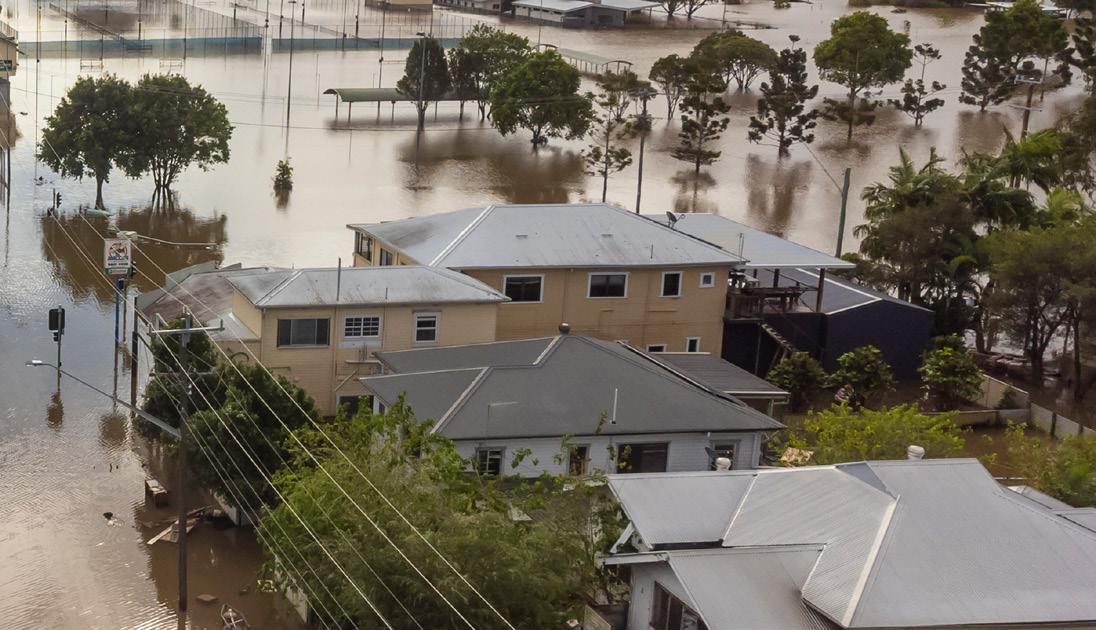
4 minute read
Coping with whatever nature throws our way
Coping with nature throws
The true value of a broker is well and truly spotlighted during a natural disaster. Natural disasters are part and parcel of living in Australia, but whereas once they were relatively infrequent occurrences, today they seem to be almost part of everyday life.
The foods earlier in the year, which afected south east Queensland and the northern coast of New South Wales, were Australia’s costliest food disaster to date. According to the Insurance Council of Australia (ICA), the event has, to the end of May 2022 cost $4.3 billion in insured losses – making it the fourth most expensive natural disaster ever in Australian history.
With claims still being lodged, however, that fgure will continue to rise and could surpass the record $5.57 billion of insured losses from the 1999 Sydney hailstorm.1
“From my perspective, the severity and duration of natural disasters seem to be increasing,” says Luke Smith, Head of Property Short Tail Claims at Allianz.
“The Lismore foods, for example, are the worst natural disaster I’ve seen in 25 years, because you’re talking about a whole town that’s impacted.’’
For anyone working in insurance, the ability to be on the ground to help in the aftermath of a natural disaster is paramount, and Smith says it’s vital to ensure you understand the challenges your customers are facing and what they’re going through.
“In the case of the Lismore foods, we got up there as quickly as we could, and we heard harrowing stories of everything from loss of life to loss of property. Houses were fully submerged, and people just didn’t know where to start,” Smith added.
Claims were submitted as quickly as possible, but three months later, Smith says there are still an average of 150 claims per week being lodged.
SUPPORTING CLIENTS THROUGH NATURAL DISASTERS
The value of insurance and insurance brokers is something that is only truly realised when an incident occurs.
Steven Hill, a Brisbane-based director at Capital Innovation Insurance Group, was faced with the unenviable prospect of not only helping his clients deal with the impact of the fooding but managing the repercussions of his home being afected, too.
“On the Sunday morning, I had a call from a client, who’s also a friend, to tell me that water was entering his basement. I went over to help him try to slow that down, and in the meantime, water started to come into our house,” he explains.
“It rained so heavily, and water got into places and buildings that it never had before. Water continued to come into our home during the afternoon and by the evening it was coming into the other side of the house, too.”
Of course, as well as managing his own situation, Hill had his clients to think of, and on Monday morning he began contacting every one of them.
“I just got my client list and began calling them to see if they’d experienced damage and if they needed to make a claim.
“Those who had experienced damage were ecstatic that I’d called and we were being proactive enough to call them rather than them having to call us,” Hill added.
whatever our way

GUIDING CLIENTS THROUGH THE PROCESS
A key component of the broker value proposition comes from having an advocate in the event of needing to make a claim, as well as having someone with the knowledge to guide you through the process.
Smith says ‘’it’s important to remember that while insurance professionals are familiar with the process, those afected are most likely not and it’s difcult for them two retain information in what is a traumatic time.’’
“On average, people have a claim once every seven years, so they’re not used to claims processes. “We can advise the client about the process, but it’s difcult to get someone who’s just had their home submerged in foodwater to retain information and to understand the steps in the process of a claim.
“We can add an awful lot of value by guiding them through that whole process, keeping them updated, and ensuring we’re providing everything needed for a quick and successful claim.” And according to Hill, being proactive – rather than reactive to a situation – is essential for brokers when faced with a natural disaster.
“I’ve seen so many things where, a few days after something’s happened, insurers and brokers have set up a web portal to lodge your claim, or they’ve created a new phone line for you to call to register a claim.
“To me, that’s not a professional response. If you’re a professional broker, you should be on the front foot, you should get out there and deal with clients individually.”
And it’s that individual service and dedication that’s going to make all the diference during an event that rips apart people’s lives, and livelihoods.
THREE TIPS FOR BROKERS
1. Speak to clients about a maintenance schedule. Sometimes, the impact of natural disasters can be reduced by maintenance and preparation. For example, cutting back tree branches and clearing guttering of leaves and debris can reduce the chances of a bushfre taking hold, while clear guttering will reduce water build up. In food-prone areas, moving goods and stock of the foor onto pallets can reduce the risk of damage from food water.
2. Remember, anyone can be afected by a natural disaster, so it’s important to review cover and sums insured of all clients regularly, particularly in light of escalating building costs.
3. The need to be weather ready is a fact of life in Australia, and planning is critically important. Every client should have an evacuation plan should a natural disaster strike, and a business continuity plan, too, to ensure they know how they’ll keep operating their business.
For further tips, please visit AllianzEngage at




